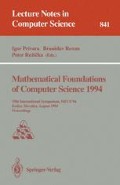Abstract
Since most Petri nets that arise from practical applications are extremely complex, methods for modular construction supported by compositional semantics have to be applied. An important property of asynchronous concurrent systems, which should be captured by semantics, is termination for every finite input, since infinite behaviour for finite inputs is caused by erroneous infinite loops and should be avoided.
We give a trace semantics for Petri nets, which describes the input/output behaviour together with termination behaviour and is compositional with respect to net operators for parallel composition with asynchronous communication. This semantics is fully abstract with respect to a very basic semantics that gives for every finite input the corresponding output and the information, whether the system terminates or not.
Preview
Unable to display preview. Download preview PDF.
References
Brock, J.D.; Ackerman, W.B.: Scenarios: A model of non-determinate computation. In: Diaz, J.; Ramos, I. (eds.), Proc. of the International Colloquium on Formalization of Programming Concepts, Peniscola 1981 (LNCS 107) Springer (1981), pp. 252–259
de Boer, F.S.; Kok, J.N.; Palamidessi, C.; Rutten, J.J.M.M.: The failure of failures in a paradigm for asynchronous communication. In: Baeten, J.C.M.; Groote, J.F. (eds.), CONCUR 91, Amsterdam 1991 (LNCS 527) Springer (1991), pp. 111–126
Brauer, W.; Reisig, W.; Rozenberg, G. (eds.): Petri nets: central models and their properties. (LNCS 254) Springer (1987)
Gold, R.: Dataflow semantics for Petri nets. In: Havel, I.M., Koubek, V. (eds.), MFCS 92 (LNCS 629) Springer (1992), pp. 275–283
Gold, R.: Datenflußsemantiken für Petrinetze. TU München, Fakultät für Informatik, Dissertation (1993)
Gold, R.; Vogler, W.: Quality criteria for partial order semantics of place/transition nets with capacities. Fund. Informaticae 17, pp. 187–210 (1992)
Jonsson, B.: A fully abstract trace model for dataflow networks. In: Proc. of the 16th Annual ACM Symposium on Principles of Programming Languages, Austin 1989, pp. 155–165
Mazurkiewicz, A.: Trace theory. In: Brauer, W.; Reisig, W.; Rozenberg, G. (eds.), Petri Nets: Applications and Relationships to Other Models of Concurrency (LNCS 255) Springer (1987), pp. 279–324
Reisig, W.: Petri nets. Springer (1985)
Vogler, W.: Failures semantics and deadlocking of modular Petri nets. Acta Informatica 26, pp. 333–348 (1989)
Vogler, W.: Modular construction and partial order semantics of Petri nets. (LNCS 625) Springer (1992)
Author information
Authors and Affiliations
Editor information
Rights and permissions
Copyright information
© 1994 Springer-Verlag Berlin Heidelberg
About this paper
Cite this paper
Gold, R. (1994). A fully abstract semantics for termination in Petri nets. In: Prívara, I., Rovan, B., Ruzička, P. (eds) Mathematical Foundations of Computer Science 1994. MFCS 1994. Lecture Notes in Computer Science, vol 841. Springer, Berlin, Heidelberg. https://doi.org/10.1007/3-540-58338-6_84
Download citation
DOI: https://doi.org/10.1007/3-540-58338-6_84
Published:
Publisher Name: Springer, Berlin, Heidelberg
Print ISBN: 978-3-540-58338-7
Online ISBN: 978-3-540-48663-3
eBook Packages: Springer Book Archive

